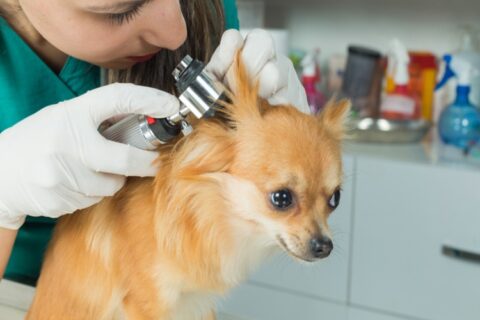Signs to Look for if Your Pet has an Allergy to Their Food
Are food allergies common in pets? Though they’re not as common as you might think, they do happen. About 10 percent of allergies in dogs are food allergies, and in cats, it’s about 10-15 percent. How do you know if your pet is allergic to his food?
A dog with food allergies might have:
- Itchy skin: This is also called allergic dermatitis, and can happen on any part of the body. It often occurs near the ears, paws, rear end, and stomach.
- Hives: Also known as urticaria, these itchy red bumps can pop up between 6 and 24 hours after your dog encounters allergens in food. If your dog has short hair, you’ll be able to see hives easily. Your dog might scratch, bite, and lick itchy areas, breaking the skin and leaving himself open to infection and hair loss.
- Gastroenteritis: Your dog may experience digestive issues, like gas, diarrhea, and vomiting.
- Swollen face: The swelling may occur on your dog’s lips, eyelids, and ear flaps.
- Chronic infections: If your dog has repeated infections in the ears or paws, this may be a food sensitivity rather than an allergy.
If your cat is allergic to cat food, you might notice:
- Itching and scratching: Once you’ve ruled out fleas and reactions to pollen or grass, you can be pretty sure your cat’s skin problem is a food allergy. Skin problems are the primary reaction to food allergies in cats.
- Secondary reactions: Sneezing, coughing,
 wheezing, runny eyes and nose, ear problems, snoring, and paw chewing.
wheezing, runny eyes and nose, ear problems, snoring, and paw chewing. - Vomiting and diarrhea are typically caused by sensitivity and not a true allergy. Still, it might be worth changing your cat’s diet.
Some common allergens in dog food include beef, chicken, lamb, soy, pork rabbit, fish, eggs, wheat, and dairy products. Less common allergens include corn, rice, barley, and oats. Most dogs are allergic to more than one thing, and an elimination diet is the best way to determine what’s causing the problem. Your vet can help you with this.
Blood testing for food allergies is as well a way to find out more quickly what is causing the symptoms. Reed Animal Hospital checks the blood tests and utilizes the results to quickly come up with a plan to solve the allergy issues.
An elimination diet works for cats, too, though their allergens are slightly different. Like dogs, cats can be allergic to corn and dairy products. Other common allergens include meat by-products, preservatives, seafood, and artificial color. As well blood testing for allergies is available for cats.
If you suspect food allergies, you can trust Reed Animal Hospital to treat your pets as if they were our own. Our goal is to help you and your pet enjoy a healthy, fulfilling life together, and in pursuit of that goal, our extraordinary team offers a wide range of services. We’ve got veterinarians, technicians, assistants, and receptionists, all prepared to help you and your pet, and we even offer referrals to specialty surgeons, many of whom will travel to our office to consult with your pet. For more information or to make an appointment, call us in Campbell at 408. 369. 1788, or in Saratoga at 408.647.2906, or contact us through our website.

